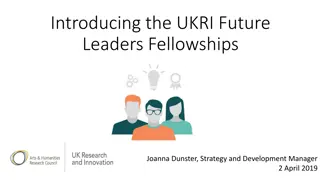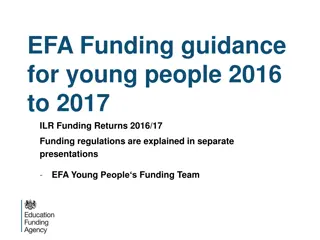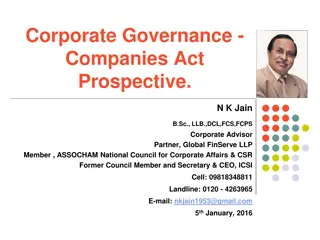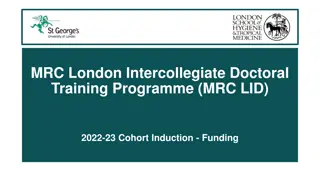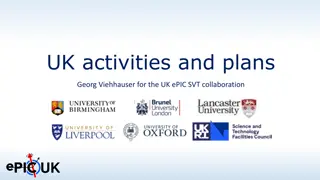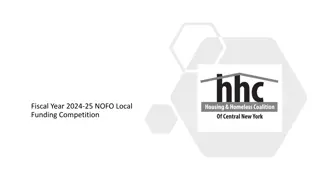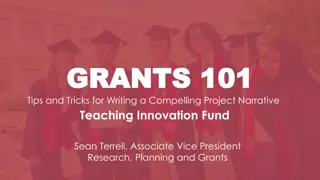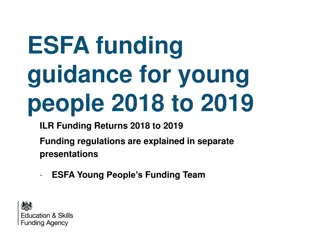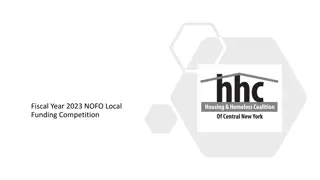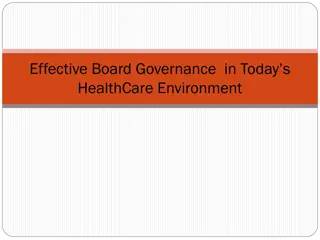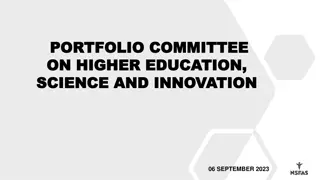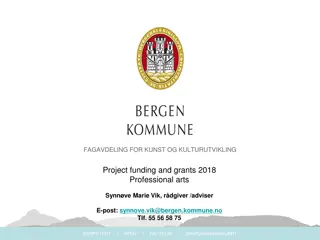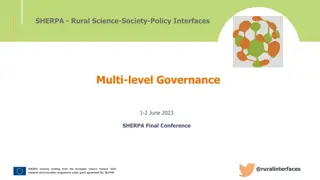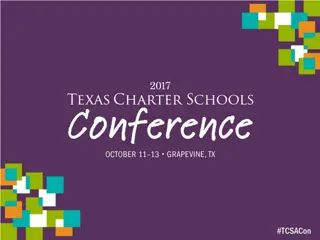UKRI Update: Challenges and Opportunities in Science Funding and Governance
Discussion on the recent developments in UKRI, including the appointment of key personnel, challenges in supporting academic partners, funding updates, and the need for a cohesive approach across research councils to enhance the UK's scientific standing and infrastructure.
Download Presentation

Please find below an Image/Link to download the presentation.
The content on the website is provided AS IS for your information and personal use only. It may not be sold, licensed, or shared on other websites without obtaining consent from the author. Download presentation by click this link. If you encounter any issues during the download, it is possible that the publisher has removed the file from their server.
E N D
Presentation Transcript
Astronomy Forum Royal Astronomical Society Brian Bowsher STFC Chief Executive 8 February 2017
Brian Bowsher A brief history And first impressions
UKRI - a great opportunity Further enhance excellent reputation for science Increase synergies/multi- disciplinary work Increase impact The whole is more than the sum of its parts
Higher Education & Research Bill Royal Assent is expected this Spring Current stage (report stage set March 6) UKRI appointments joins Chairman Sir John Kingman Professor Sir Mark Walport announced as Chief Executive Designate Applications open for the UKRI Board members and the advert for CFO is imminent Original plans were to establish an UKRI shadow board in April 2017 Potential to phase appointments for the Councils and Executive Chairs to aid transition
Some challenges Must ensure academic partners are provided the support and services they need to continue delivering world leading research Requirement for scientists and facilities to be retained within STFC Uncertainties in support services Single culture across all RCs, Innovate and HEFCE? STFC, NERC, MRC, BBSRC more than grants 9,000+ scientists across UKRI family Critical national science infrastructure Flexibility to grow
Autumn Statement 2bn p.a. for science and innovation by 2020/21 Funding far larger than anticipated All for RCs, IUK and HEFCE Will ramp up to full amount BEIS will consult on spending priorities Industrial Strategy Challenge Fund workshops held with community in January Perhaps some injection to QR? Allocations Funding for 2017/18 resolved by BEIS by March 2017
Key points 250 17.6m gap between capital budget & requirement each year 200 Core capital budget 150 12.3m gap between resource budget & requirement each year Global Challenges Research Fund m 100 Core resource budget 50 0 2016-17 2017-18 2018-19 2019-20 2020-21 We told government that constant volume (flat-cash plus inflation) would avoid the need to withdraw from significant projects But our allocation was flat Capital cut of 40% from 2019/2020 in our indicative allocation
Balance of Programmes Objectives 1. To review what science and funding has changed since the last programmatic review (2012-13) 2. To review the PPAN current and planned programme for the next five years 3. To review any changes to the strategic priorities of the science roadmaps and the subsequent impact 4. To consider any potential future changes in the programme or funding landscape 5. To review any critical decision points identified by STFC and their implications 6. To review the appropriate balance between subject areas and between R&D, construction and exploitation
Timeline July 2016 5-6 July - Science Board - kicks off BoP exercise Gathering Phase Information Aug 2016 15 August First BoP Panel Sep 2016 Initial report to STFC Council September - Second BoP Panel September- AP chairs input to BoP Panel Oct 2016 17-18 October First BoP Panel meeting Assessment Phase Nov 2016 28-29 - Second BoP Panel meeting Dec 2016 12-13 Science Board Feb 2017 Report findings to first Science Board meeting of 2017
Immediate pressures International Facilities Annual funding gap of 21m p.a. due to foreign exchange risk BEIS WILL COVER Large Facilities Allocation assumes a savings target of 1.8m for 2016/17, rising to 7.8m in 2019/20 Photowalk overall winner Core Programme Impact of 7th year of flat-cash Funding gaps in both resource and capital by 2020/21 if we do nothing
Some of our arguments for increased funding Large Facilities ISIS and CLF have not operated in full for many years - full operations would require an additional 26m p.a. by 2019/20 Core Programme Funding for Astronomy grant have remain constant whilst the community is growing, increasing the proportion of excellent science that we are unable to fund Almost half of astronomy applicants in the most recent round received no funding PP Experimental funds reduced by 30% since 2007 send fewer physicists to CERN (6%) than Germany (11%) or Italy (15%) PhD studentships decreased by 25% since 2008 we could treble Etc . . .
Global Challenges Research Fund 1.5bn fund, part of UK's Official Development Assistance (ODA) commitment ODA-funded activity focuses on outcomes that promote long-term sustainable growth of countries on OECD Development Assistance Committee (DAC) list - Africa, Asia, Latin America Address global challenges through disciplinary and interdisciplinary research, training, capacity and capability building RCUK Collective Fund and individual research council Funds (STFC 3.5m pa from FY17/18 - details to be announced) Second RCUK collective call to be announced in next few months, likely to be outline then full bids. Significant opportunity to develop new and nurture existing collaborations with DAC listed countries
Newton Fund 735M part of UK's Official Development Assistance (ODA) commitment To use science and innovation partnerships to promote economic development and social welfare. Astronomy success include: DARA South African VLBI Network development programme led by Melvin Hoare, Leeds. STFC NARIT (Thailand) call for capacity building in software & hardware infrastructure and data handling through astronomy 6 grants awarded Exploring new partnerships to enable the astronomy community to engage more in Newton Fund
Industrial Strategy In January, Theresa May and the Cabinet met at STFC s Daresbury Laboratory to launch the Green Paper Building our Industrial Strategy for public consultation We want to build an industrial strategy that addresses long-term challenges to the UK economy. Our aim is to improve living standards and economic growth by increasing productivity and driving growth across the whole country.
Industrial Strategy Challenge Fund: focus areas Bioscience and Bioeconomy Leading edge healthcare and medical technology Manufacturing processes and materials New energy technologies (inc battery storage) Quantum technologies Robotics and AI Satellite and Space Technology Transformative digital technologies Integrated and sustainable cities Technology for Creative Industries Cross Cutting
Areas of potential impact 10% of STFC staff are non-UK EU or EEA nationals 80% of our EU staff are in SET roles Large facility usage by non-UK EU academics Foreign exchange rate fluctuations: International subscriptions variation covered by BEIS but not the extra cost of travel and procurement. Loss of EU funding for university groups Seven years of flat cash and loss of EU funding = real trouble for some
What next? Image result for article 50 Brexit White Paper has been published Need to engage We can only influence the how if we re listened to Focus on providing high quality data and analysis to Government We want Ministers to understand the impact so they can plan to mitigate in advance, e.g. funding There are opportunities from the Government s desire for UK to remain a world-class research nation New funding? More support and engagement?
Programme Highlights Maybe .
Astronomy Programme Broadly Astronomy funding covers: Exploitation grants (~ 29m p.a.) ESO membership and E-ELT development (~ 25m p.a.) SKA preparation (~ 9m p.a.) Other operations and developments - ING, e-MERLIN, LSST etc. (~ 12m p.a.) Currently, broadly flat-funding, including recent investments except for E-ELT instruments and SKA development Await outcome of Balance of Programmes
ESO Almost 80% of the large contracts for E-ELT construction now let with first light planned for 2024 Discussions commencing on priorities for phase 2 and timescale for second phase instruments (HiRES & MOS) linked to possibility of EIB loans to cover cash flow New DG Xavier Barcons starts in September Long Term Perspective report published in Messenger Extension to APEX agreement approved Search for new ALMA director commenced VISTA enhancements programme now complete Modest support provided to SOXS and to Ultracam /Hipercam on La Silla
Square Kilometre Array (SKA) UK Government pledged over 220m for first Phase construction plus operations Major work underway to match design to available cash (675mEuros cap) report to Board March Strategy for UK role in tender opportunities being worked, through assisted by industrial liaison officer Negotiations on Treaty nearing completion legal scrub due, signing by summer HQ at Jodrell Bank construction delayed by few weeks by contractual issues Start construction of first Phase in 2019
Projects under construction Project Project MOONS HARPS3 DESI SOXS DKIST HARMONI / METIS LSST WEAVE Projects in operation Project Status ING WEAVE preparation e-MERLIN Under review LOFAR Operational Liverpool Telescope Extended by 1 year NGTS Operational GAIA data centre Operational JCMT/SCUBA2 Operational
Projects in waiting We are aware of a number of new developments and continuations looking for support. We await the outcome of the Balance of Programmes exercise to advise. For example: Extensions to: NGST operations; LT; Gaia; SCUBA2, Wide field units. New developments: EST; LT2; wide field spectroscopy for 8m; ALMA developments, CMB projects, data centres/ HPC. Support for space mission development and networking
Space Programme STFC provides funds for exploitation and blue skies technology via AGP on average 10% of total new funding goes to technology (ground and space). Recent advice to UKSA on ESA M5 mission selection via SPAC and SB Supporting Gaia data exploitation as well as all recent missions with UKSA interest via consolidated grants Supporting JWST Public Engagement programme with UKATC STFC providing modest resource to mission groups to foster networking. ESA: Euclid, Athena, JUICE, Solar Orbiter, Cassini Non-ESA: Astrosat, OSIRIS-Rex
Astronomy Grants Panel In the 2016 round AGP received a total of 32 applications with 204 co-applicants proposing a total of 202 projects: a 24% rise over the same round 3 years ago These requested 196 PDRAs and technicians at a total cost of 27M p.a New applications from Bath, Lancaster, Glasgow/Dundee and Northumbria/Durham consortia largely unable to support. We were able to support 89 of the highest-ranked projects, comprising funding for 74 PDRAs and technicians costing 9.3M p.a. Average FeC was 16% (median 20%) Flat cash funding biting hard and many excellent proposals unfunded For 2017 Jim Wild is chair and Lyndsay Fletcher vice-chair
HPC, HTC and Big Data? We recognise that DiRAC requires planned updating and development and are working to find the necessary capital and resource We are paying a share of the UK fee to be a member of PRACE Approach to be part of a broader and more integrated plan for STFC computing so working with leads in UKT0, STFC labs and major projects to provide a strategic approach, and also a cross-council initiative. In close communication with BEIS Realising a data centre to cover SKA, LSST, Euclid etc. requires capital we do not have but is part of the plan.
EU and Astronet UK has done well out of EU network support particularly for tech development and transnational access: Opticon, Radionet, Solarnet, Europlanet, Asterics, Aeneas etc Also big beneficiaries from ERCs almost 100MEuros Played key role in the development of European Science Vision and Infrastructure Roadmap for Astronomy via Astronet Poised to continue timed with US Decadal Survey, via new Astronet funded by agencies
Studentships and Fellowships Applications for a centre for doctoral training in data intensive science were assessed in January . There were eight applications, all of them considered to be of high quality. The successful bid was from UCL 153 applications for this year s Ernest Rutherford Fellowship round have been received. Interviews are being held on as we speak Doctoral Training Partnership studentship allocations were announced in December for 2017 starters only. The allocations for 2018 starters will be made by the end of this year, using the same input data for the algorithm collected in 2016 We are currently consulting on a proposal to align our sanctions policy on PhD submission times with our expectation that theses should be submitted within the funded period of the PhD. The closing date for responses is 17 February The next closing date for Industrial CASE studentships is 6 July
Summary Some challenging times ahead Balancing the programme under flat cash Preparing for UKRI Preparing for the next CSR Opportunities in all of these Government recognises your value and doesn t intend harm UKRI should deliver more coherent funding approach allowing excellence to shine


